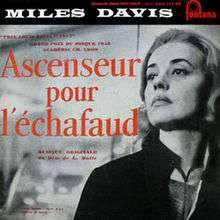Ascenseur pour l'échafaud (soundtrack)
| Ascenseur pour l'échafaud | ||||
|---|---|---|---|---|
 | ||||
| Soundtrack album by Miles Davis | ||||
| Released | 1958 | |||
| Recorded | December 4 and 5, 1957 | |||
| Studio | Le Poste Parisien, Paris | |||
| Genre | Modal jazz,[1] cool jazz[2] | |||
| Length | 71:18 | |||
| Label | Fontana | |||
| Miles Davis chronology | ||||
| ||||
| Professional ratings | |
|---|---|
| Review scores | |
| Source | Rating |
| Allmusic | |
| Los Angeles Times | |
| Mojo | favorable[5] |
Ascenseur pour l'échafaud is an album by jazz musician Miles Davis. It was recorded at Le Poste Parisien Studio in Paris on December 4 and 5, 1957. The album features the musical cues for the 1958 Louis Malle film Ascenseur pour l'échafaud.
Background
Jean-Paul Rappeneau, a jazz fan and Malle's assistant at the time, suggested asking Miles Davis to create the film's soundtrack – possibly inspired by the Modern Jazz Quartet's recording for Roger Vadim's Sait-on jamais (Lit: 'Does One Ever Know', released as: 'No Sun in Venice'), released a few months earlier in 1957.
Davis was booked to perform at the Club Saint-Germain in Paris for November 1957. Rappeneau introduced him to Malle, and Davis agreed to record the music after attending a private screening. On December 4, he brought his four sidemen to the recording studio without having had them prepare anything. Davis only gave the musicians a few rudimentary harmonic sequences he had assembled in his hotel room, and, once the plot was explained, the band improvised without any precomposed theme, while edited loops of the musically relevant film sequences were projected in the background.
Release and reception
In Europe, the soundtrack was originally released as a 10 inch LP on the Fontana label.[6] In America it was released by Columbia as side one of the album Jazz Track (CL 1268), with the second side filled by three new tracks recorded with his regular sextet (later to be re-released on the 1958 Miles CD). Jazz Track received a 1960 Grammy nomination for Best Jazz Performance, Solo or Small Group.
In the opinion of Romina Daniele, the musical mood and characteristics of the soundtrack immediately preceded and introduced Miles Davis's subsequent records Milestones (1958) and Kind of Blue (1959).[7]
Track listings
10"LP
Side one
| No. | Title | Length |
|---|---|---|
| 1. | "Générique" | 2:45 |
| 2. | "L' Assassinat de Carala" | 2:10 |
| 3. | "Sur L'Autoroute" | 2:15 |
| 4. | "Julien Dans L'Ascenseur" | 2:07 |
| 5. | "Florence Sur Les Champs Élysées" | 2:50 |
Side two
| No. | Title | Length |
|---|---|---|
| 1. | "Dîner au Motel" | 3:58 |
| 2. | "Évasion De Julien" | 0:53 |
| 3. | "Visite Du Vigile" | 2:00 |
| 4. | "Au Bar du Petit Bac" | 2:50 |
| 5. | "Chez Le Photographe Du Motel" | 3:50 |
CD
| No. | Title | Length |
|---|---|---|
| 1. | "Nuit Sur Les Champs-Élysées (take 1)" | 2:25 |
| 2. | "Nuit Sur Les Champs-Élysées (take 2)" | 5:20 |
| 3. | "Nuit Sur Les Champs-Élysées (take 3)" | 2:47 |
| 4. | "Nuit Sur Les Champs-Élysées (take 4)" | 2:59 |
| 5. | "Assassinat (take 1)" | 2:02 |
| 6. | "Assassinat (take 2)" | 2:10 |
| 7. | "Assassinat (take 3)" | 2:10 |
| 8. | "Motel" | 3:56 |
| 9. | "Final (take 1)" | 3:05 |
| 10. | "Final (take 2)" | 3:00 |
| 11. | "Final (take 3)" | 4:04 |
| 12. | "Ascenseur" | 1:57 |
| 13. | "Le Petit Bal (take 1)" | 2:40 |
| 14. | "Le Petit Bal (take 2)" | 2:53 |
| 15. | "Séquence Voiture (take 1)" | 2:56 |
| 16. | "Séquence Voiture (take 2)" | 2:16 |
| 17. | "Générique" | 2:45 |
| 18. | "L' Assassinat de Carala" | 2:10 |
| 19. | "Sur L'Autoroute" | 2:15 |
| 20. | "Julien Dans L'Ascenseur" | 2:07 |
| 21. | "Florence Sur Les Champs Élysées" | 2:50 |
| 22. | "Dîner au Motel" | 3:58 |
| 23. | "Évasion De Julien" | 0:53 |
| 24. | "Visite Du Vigile" | 2:00 |
| 25. | "Au Bar du Petit Bac" | 2:50 |
| 26. | "Chez Le Photographe Du Motel" | 3:50 |
Note: The track listing above refers to the currently available CD version. The original soundtrack to the film, as mixed and edited (with additional reverb) in 1958, and used for the screen, can be heard in tracks 17 to 26.
Personnel
- Miles Davis – trumpet
- Barney Wilen – tenor saxophone
- René Urtreger – piano
- Pierre Michelot – bass
- Kenny Clarke – drums
References
- ↑ Pejrolo 2006, pp. 63-82.
- ↑ Dimery 2010, p. 34.
- ↑ Nastos, Michael G. (2000). Ascenseur Pour l'Échafaud – Miles Davis | AllMusic: Review. Allmusic. Retrieved on 2011-03-20.
- ↑ Feather, Leonard (June 18, 1989). "Mixed Doubles in New Jazz Releases". Los Angeles Times. Retrieved May 22, 2016.
- ↑ Caulfield, Mary (March 3, 2011). Miles Davis – Disc of the day – Mojo. Mojo. Archived from the original on 2011-03-20.
- ↑ Ascenseur Pour L'Échafaud, at Discogs.com, accessed June 18, 2015
- ↑ Daniele, Romina (2011). Ascenseur pour l'échafaud, Il luogo della musica nell'audiovisione. Milan: RDM. pp. 133–136. ISBN 978-88-904905-9-0.
Bibliography
- Dimery, Robert (2010). 1001 Albums You Must Hear Before You Die. Universe. ISBN 0789320746.
- Pejrolo, Andrew (April 2006). "Transatlantic Interplays: The Origins of Miles Davis's Modal Jazz in Ascenseur pour l'échafaud". Atlantic Studies. 3 (1). ISSN 1478-8810.